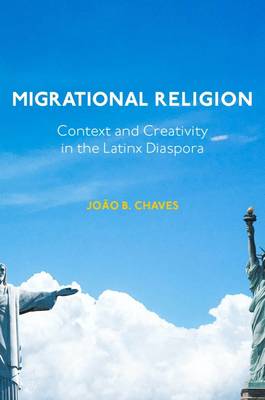
- Afhalen na 1 uur in een winkel met voorraad
- Gratis thuislevering in België vanaf € 30
- Ruim aanbod met 7 miljoen producten
- Afhalen na 1 uur in een winkel met voorraad
- Gratis thuislevering in België vanaf € 30
- Ruim aanbod met 7 miljoen producten
Omschrijving
Many scholars have documented how migration from Latin America to the United States shapes the interconnected spheres of religious participation, political engagement, and civic formation in host countries. What has largely gone unexplored is how the experiences of migration and adaptation to the host country also shape the ecclesiological arrangements, theological imagination, and communal strategies of immigrant religious networks. These communities maintain close ties with their home countries while simultaneously developing a religious life that distinguishes them both from their home countries and from faith communities of the dominant culture in their host countries.
João Chaves offers an account of the dynamics that shape the role of immigrant churches in the United States. Migrational Religion acts as a case study of a network formed by communities of Brazilian immigrants who, although affiliated with the Southern Baptist Convention, formed a distinctive ethnic association. Their churches began to appear in the United States in the 1980s due to Brazilian Baptist missionary activity. As Brazilian migration increased in the last decades of the twentieth century, hundreds of Brazilian evangelical churches were founded to cater to first-generation immigrants. Initially their leaders conceived of these churches as extensions of their denomination in Brazil. However, these church communities were under constant pressure to adapt to their rapidly changing context, and the challenges of immigrant living pushed them in exciting new directions.
Brazilian churches in the United States faced a number of issues peculiar to their nature as diasporic communities: undocumented parishioners, membership fluctuation caused by national and international migration patterns, anti-immigrant prejudice, and more. Based on six years of ethnographic work in eleven congregations across the United States, dozens of interviews with Brazilian pastors, and extensive archival history in English and Portuguese, Migrational Religion documents how such churches adapted to unique challenges, and reveals how the diasporic experience fosters incipient theologies in churches of the Latinx diaspora.
Specificaties
Betrokkenen
- Auteur(s):
- Uitgeverij:
Inhoud
- Aantal bladzijden:
- 213
- Taal:
- Engels
Eigenschappen
- Productcode (EAN):
- 9781481315944
- Verschijningsdatum:
- 1/10/2021
- Uitvoering:
- Hardcover
- Formaat:
- Genaaid
- Afmetingen:
- 203 mm x 234 mm
- Gewicht:
- 498 g

Alleen bij Standaard Boekhandel
Beoordelingen
We publiceren alleen reviews die voldoen aan de voorwaarden voor reviews. Bekijk onze voorwaarden voor reviews.











